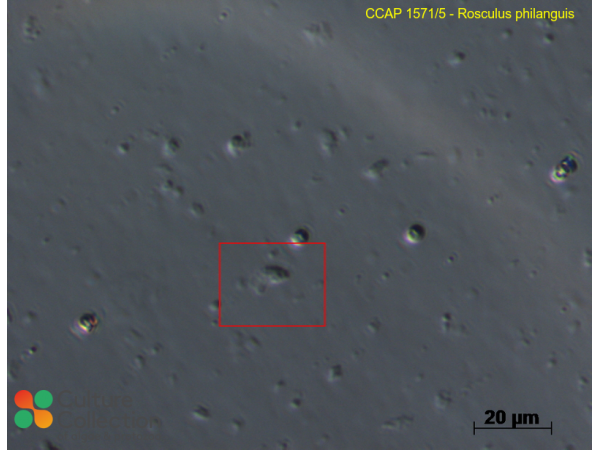References [ 1 ]
Schuler GA, Tice AK, Pearce RA, Foreman E, Stone J, Gammill S, Willson JD, Reading C, Silberman JD & Brown MW (2018) Phylogeny and Classification of Novel Diversity in Sainouroidea (Cercozoa, Rhizaria) Sheds Light on a Highly Diverse and Divergent Clade Protist 169: 853-874.
Division/Phylum: Discoba Class: Heterolobosea Order: Acrasida
Note: for strains where we have DNA barcodes we can be reasonably confident of identity, however for those not yet sequenced we rely on morphology
and the original identification, usually made by the depositor. Although CCAP makes every effort to ensure the correct taxonomic identity of strains, we cannot guarantee
that a strain is correctly identified at the species, genus or class levels. On this basis users are responsible for confirming the identity of the strain(s) they receive
from us on arrival before starting experiments.
For strain taxonomy we generally use AlgaeBase for algae and
Adl et al. (2019) for protists.
| Attributes |
| Authority | Schuler & Brown 2018 |
| Isolator | Silberman (2015) |
| Collection Site | Western ratsnake faeces (Pantherophis obsoletus) near Conway, Arkansas, USA |
| Notes |
Isolation: single cell; Clonal culture; Minimally inhabiting snake dung. Average length in locomotion 9.7 μm, average width in locomotion 6.1 μm, verage nucleus diameter 1.5 μm, average nucleolus diameter 1.0 μm, and average cyst diameter 4.6 μm. Fast growing with broad hyaline area at the anterior of the motile cell. Primarily a bacterivore. |
| Axenicity Status |
Monoxenic |
| Area |
North America |
| Country |
USA |
| Environment |
Animal |
| GMO |
No |
| Group |
Protozoa |
| Latitude |
35 8' N |
| Longitude |
92 22' W |
| In Scope of Nagoya Protocol |
No |
| ABS Note |
Collected pre Nagoya Protocol. No known Nagoya Protocol restrictions for this strain. |
| Collection Date |
c 2015 |
| Original Designation |
RSA |
| Pathogen |
Not pathogenic: Hazard Class 1 |
| Strain Maintenance Sheet |
|
| Toxin Producer |
Not Toxic / No Data |
| Type Culture |
Yes |
| Taxonomy WoRMS ID |
|


